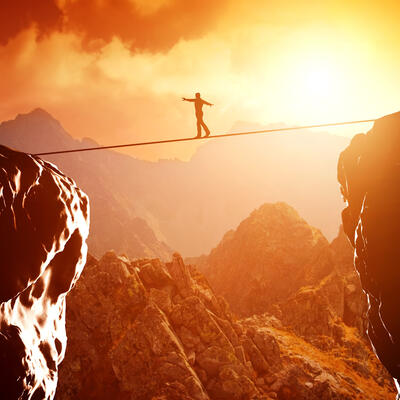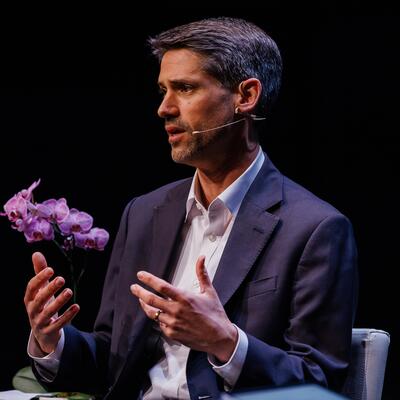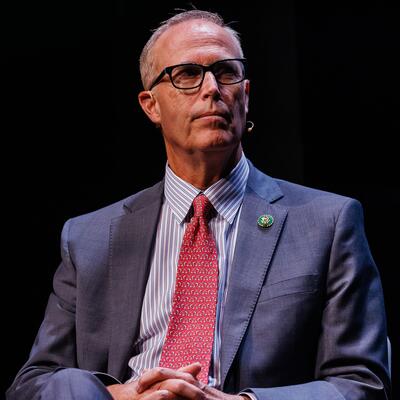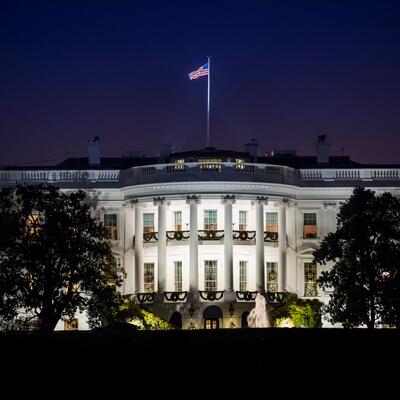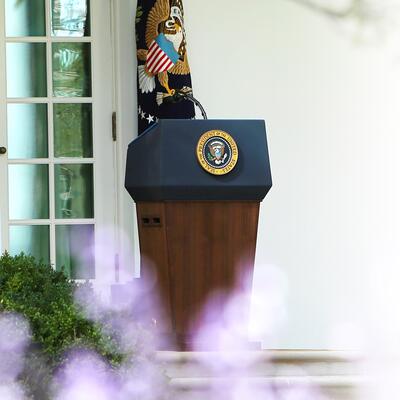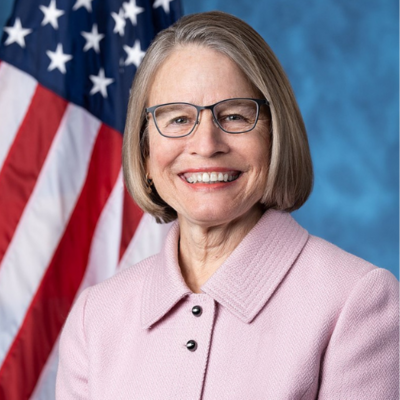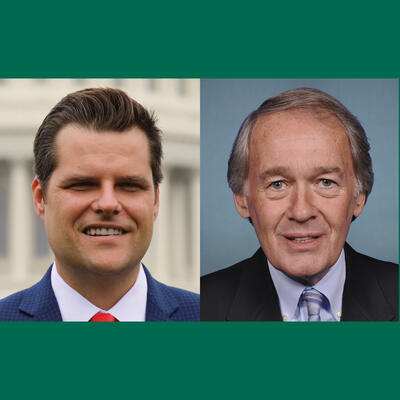
The Art of the Green Deal
Guests
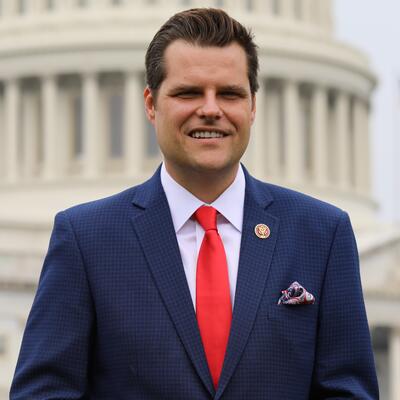
Matt Gaetz

Miranda Green
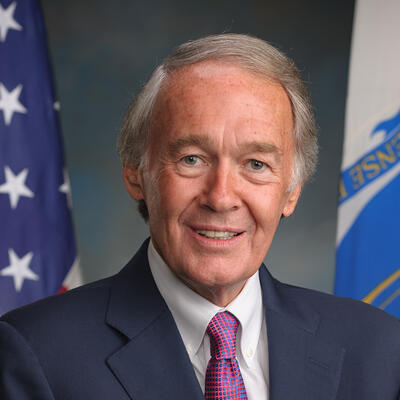
Ed Markey
Summary
The climate conversation in Washington has changed enough that Democrats and Republicans are talking climate deals. A lot of that change can be attributed to the Green New Deal, a Democratic resolution introduced by Rep. Alexandria Ocasio-Cortez and Sen. Ed Markey.
“What we're doing with the Green New Deal is we’re putting together an army that won't just be a resolution, it's a revolution,” boasts Markey, who has served over 40 years in Congress and co-authored the last big legislative push for national climate policy a decade ago. Markey says that he and AOC “share a passion to create a movement which is going to change the relationship between the American people and the fossil fuel industry.”
That relationship is also targeted in the Green Real Deal, a market-based alternative to the Green New Deal put forward by Republican Rep. Matt Gaetz of Florida. “Fossil fuels are not our future. They just aren’t,” proclaims Gaetz, very much out of step with GOP orthodoxy in general and the current administration’s policies in particular.
Less surprising than a Republican proposing to eliminate fossil fuel subsidies is that a GOP call for climate action is coming from Florida. Gaetz, whose district in the Florida panhandle was battered by Hurricane Michael in 2018 is an ardent supporter of President Trump – except when it comes to climate science.
“You can either believe the climate deniers, or you can believe your lying eyes,” he says, “and I'm from the pro-science wing of the Republican Party.” But are there really any prospects for a legislative deal passing while a pro-fossil fuel climate denier occupies the White House?
“It's more likely to see ideas like this passing as ballot initiatives in states as test kitchens that can then kind of branch out to other states than something really holistically passing through Congress before 2020,” says Miranda Green, an energy and environment reporter covering Congress for The Hill.
Still, Green is impressed with Gaetz’s fossil fuel iconoclasm and even with Trump’s apparent need to address climate – if never actually by name – in a recent White House speech. “It shows that the issue of climate change has really put itself at the center of politics right now,” she says, “at the center of the political debate.”
Resources From This Episode (3)
Full Transcript
Greg Dalton: This is Climate One, changing the conversation about energy, the economy, and the environment.
Greg Dalton: The climate conversation in Washington has changed enough that Democrats and Republicans are talking climate deals.
Ed Markey: What we're doing with the Green New Deal is we’re putting together an army that won't just be a resolution, it's a revolution.
Matt Gaetz: The Green Real Deal is a response to the challenges that we face with climate that leans into innovation rather than regulation.
Greg Dalton: Could the glacial pace of climate action be picking up on both sides of the aisle?
Miranda Green: It is much more likely to see ballot initiatives passing in states as test kitchens that can then branch out to other states than something passing through Congress before 2020.
Greg Dalton: The Art of the Green Deal. Up next on Climate One.
Greg Dalton: Where is the U.S. headed on political climate action: Green New Deal, Green Real Deal, or no deal at all? Climate One conversations feature oil companies and environmentalists, Republicans and Democrats, the exciting and the scary aspects of the climate challenge. I’m Greg Dalton.
Greg Dalton: The state of Florida is on the frontlines of climate change in the lower 48. So it’s no surprise to find that Florida Republicans are on the vanguard of their party’s calls for climate action.
Matt Gaetz: You can either believe the climate deniers, or you can believe your lying eyes. And I'm from the pro-science wing of the Republican Party.
Greg Dalton: That’s Representative Matt Gaetz [GATES], whose district in the Florida panhandle was battered by Hurricane Michael in 2018. Gaetz is a vigorous supporter of President Trump – except when it comes to climate science.
Matt Gaetz: We've had a whole political discourse that has been based on phony science largely on one side.
Greg Dalton: I’ll talk to Representative Gaetz later in the show about the Green Real Deal – his market-based alternative to the more regulatory approach of the Democrats’ Green New Deal. First I sit down with one of that plan’s co-sponsors, Massachusetts Senator Ed Markey. Markey has served over 40 years in Congress and co-authored the last big legislative push for national climate policy a decade ago. I began by asking him what it’s been like working on the Green New Deal with his young, insurgent co-sponsor, New York representative Alexandria Ocasio-Cortez.
Ed Markey: Well, it's an intergenerational compact. We know that the problem can't be solved unless we make this the generational challenge. And so we share a passion to create a movement which is going to change the relationship between the American people and the fossil fuel industry their power, their money, their ability to distort what happens in Washington just has to change. And so what Congresswoman Ocasio-Cortez and I agreed upon in introducing the Green New Deal was that we were going to try to lift the gaze of Americans to the consolation of possibilities in terms of deploying clean energy technologies, creating millions of jobs. And finally once and for all wresting the power in Washington away from the fossil fuel industry and their control over the climate agenda for the planet.
Greg Dalton: Though there's some resistance coming from within your own party. Barney Frank, longtime progressive colleague of yours, said the Green New Deal was a loser in 2020 and said that society could only absorb so much change it wants. What do you say to that, that this is too ambitious?
Ed Markey: Well, the polling says that climate along with healthcare is now at the top of the interest especially of democratic primary voters in our country. And I think that's going to make a big difference in the 2020 election cycle. I think that what we’re going to find is that it's becoming a voting issue. The intensity level is very high and that increasingly Republicans are going to understand that they are going to vote against the solar and wind and all electric vehicle revolution at their own political peril. So I think there’s something very special that’s happening we can see it especially in young people at the high school and college level. We can see it all around the world actually millions of young people are now marching. It has an intensity that I think is going to make a big, big difference in the 2020 election cycle.
Greg Dalton: What’s your plan for the Green New Deal, is it to lay foundation to develop policies so obviously nothing’s going to happen with climate denier in the White House. What’s your plan for the next couple years what are you trying to do?
Ed Markey: Well you are right. The denier in chief is sitting in the White House he says that it's a Chinese hoax. So politically, we could hope that he could change his mind in the next year and a half, but it's more likely he's going to continue to try to use the remaining 50,000 coal miners in America as a proxy for how he fights for blue-collar workers in our country. And we care about those coal miners and we want to ensure that there is a just transition for them. But at the same time what we’re going to do is make the case that we've already created 350,000 wind and solar jobs, that there are millions of clean energy jobs at writ large already in our economy and that there are millions more to be created. And that the economic argument is absolutely overwhelming and the moral imperative is equally compelling. So I feel very confident that if we a more aggressive if we lean into the issue if we're willing to stand up and fight for it. All across the country on campuses out of town meetings in the suburbs there are people now rising up who weren’t there in 2016 who are going to make the voting difference in the next election.
Greg Dalton: And there's also political influence, other corporations. When you did this 10 years ago there was the U.S. climate action partnership. There was basically a political center in this country that had industrial corporations, Ford Motor Company, John Deere even oil companies. I don't see that kind of political unification right now saying we need climate action like there was 10 years ago behind Waxman-Markey.
Ed Markey: I'm not sure you're right about that. I think that there is actually far many more corporations today that are willing to sign up for this agenda. I think that we've already proved in the marketplace that wind and solar and all electric vehicles are economically competitive. We didn't have that actual proof back in 2009 when Waxman-Markey passed through the house. And so I think we actually have far more working material politically to work with. We have to consolidate it associations like CERES and others or organizing CEOs to lobby Washington on the climate change issue and in far greater numbers that existed in 2009. And I'm quite confident that before we hit too deep into the presidential cycle of next year that we're going to see a pretty vocal private sector advocacy for this revolution that ultimately will actually have a bigger voice because of the Green New Deal than they had in 2009.
Greg Dalton: Certainly we saw that after the announced pull out of the Paris climate deal a lot of companies said, no we want to stay in. There is a Republican backed proposal, the Baker-Shultz plan, that has support from fossil fuel companies. And they want fossil fuel indemnification as part of a deal like tobacco in the 60s, put the warning on the Surgeon General's warning on a pack of cigarettes. Are you willing to entertain liability shield from lawsuits for fossil fuel companies to be part of a deal?
Ed Markey: Well, are the companies willing to accept hundred dollars a ton price for carbon. The answer is no, they won't. The price that those industries are willing to accept is a price that is far too low. And they also want as part of the agreement that we take off the books the fuel economy Senate, so the vehicles which we drive the appliance efficiency standards which we already have on the books for the air-conditioning and heating that we have in this room that we’re conducting this interview and every other building across the whole country. So a lot depends upon how aggressive the proposal is from the fossil fuel industry. But you say put me over in the skeptics camp that they're willing to actually support a price that we know would work in order to create a change that would ultimately wind up as something that was destructive of their business model because it would lead to a radical reduction in oil and coal consumption in our country.
Greg Dalton: Some people are concerned that the Green New Deal will involve wealth and power redistribution, you know, because there’s some aspects of this about certainly higher taxes job guarantees. Can climate be solved without, you know, really we have to transform the economy can't just take out brown and put in green, there’s big changes. Does that necessarily involve wealth and power redistribution?
Ed Markey: It involves a technological revolution. It involves changing technologies in our society. Yes, when we move from the black rotary dial phone to having a computer in our pockets, it did cause some disruption. I don't think that people would want to go back to black rotary dial phones because it was going to cause disruption in the existing way in which we communicated.
Greg Dalton: No one who drives an electric car says I think I need to go back to gas.
Ed Markey: Well, I don't think anyone who has watched the solar revolution take place over the last 10 years, and that's really the entirety of the time in which it's existed. Thanks to some huge income redistribution has occurred I don't think that the huge installation of wind over the last 10 years has led to people said, oh my goodness lot of income redistribution there. I don't think they say the same thing when I watch an all-electric vehicle driving down the street. I don't think when they purchase a car which gets 45 miles a gallon instead of 25 miles a gallon thinks that some huge economic adjustment has taken place. So the people who complain about the economic redistribution want to call the plan socialistic. But those same people do not complain that the oil and gas and coal and nuclear industries have been receiving subsidies from the federal and state taxpayers for 100 years. Only when the new industries stand up and say, well can we also qualify for those same tax breaks are they called socialistic? So the hypocrisy, just the absolute disgrace of the fossil fuel industry in using socialism as an argument against the Green New Deal just shows you how hypocritical they are because they have been the principal beneficiaries of the welfare state in the United States for 100 years. They’re given taxpayer subsidy and protected by regulations from having to deal with the externalities the other harms which they’re doing in our society. So, you know, there's an old saying that hypocrisy is the tribute which vice pays to virtue. So they tipped their cap on their TV commercials, Sunday morning on Meet the Press or Face The Nation they're working hard on finding new solutions to energy. And so that's hypocrisy because in Washington they’re working hard to make sure that any subsidy for any competitor is taken away. And what we're doing with the Green New Deal is we’re putting together an army that won't just be a resolution, it's a revolution which it's unleashed and they're afraid that it's coming at them with political razor blade sharp edges in the 2020 election cycle.
Greg Dalton: You’re listening to a Climate One conversation about the Green New Deal. Coming up, more with U.S. Senator Ed Markey, plus Florida Republican Matt Gaetz on his vision for climate action.
Matt Gaetz: We've got to eliminate a lot of the subsidies that we provide for the fossil fuel industry. Fossil fuels are not our future. They just aren’t.
Greg Dalton: That’s up next, when Climate One continues.
Greg Dalton: This is Climate One. I’m Greg Dalton, and we’re talking about the Green New Deal with its sponsor in the United States Senate, Ed Markey, Democrat of Massachusetts. Even with the current pro-fossil fuel agenda in the White House, some Republicans in Congress are willing to embrace clean energy. I asked Senator Markey whether there was anyone on the other side of the aisle that perhaps even privately he thought he could do business with on climate.
Ed Markey: Well, some Republicans are bringing out old ideas for more incentives for nuclear power and carbon capture and sequestration. But, we've yet to hear people say that they would support permanent tax breaks for wind, and solar and for all electric vehicles and for battery and storage technology. So we haven't heard that yet. So only at that point, you know, is it reasonable to say that Republicans are moving towards a position where we can put together a bipartisan bill that would in fact make a meaningful difference in terms of reducing greenhouse gases.
Greg Dalton: While Republicans have clearly been the obstructionist party recently there's also been times where Democrats have also obstructed progress on climate. 1994, Robert Byrd, West Virginia, President Clinton wasn’t able to keep his own party together for the BTU tax which was the first carbon tax. Also, I'd like to share with you a video. This is a video that you may have seen Senator Joe Manchin, Joe Manchin running for the U.S. Senate. Let’s listen to this and I’ll get your response.
Joe Manchin: I sued EPA, and I’ll take dead aim at the Cap and Trade Bill because it’s bad for West Virginia.
Greg Dalton: So that's a Democratic Senator shooting a bullet through your 1400-page Waxman-Markey Bill. Have you talked to him about the Green New Deal, is he on board this time or he’s gonna shoot a bullet through the Green New Deal?
Ed Markey: Well, I actually said to Joe that was a pretty good ad. Because it got his opposition to gun control and his opposition to the Waxman-Markey Cap and Trade Bill all in one 30-second commercial. So I complimented him on the brilliance of whoever did that ad for him. And we’re friends, and increasingly what I feel is about to unfold is a real conversation that begins with nuclear power and includes carbon capture and sequestration for fossil fuel technologies going forward. But also a pathway for us to begin to put together constructive policies. The one thing that's different between Joe and a lot of the Republicans is that Joe actually believes in climate science. He accepts the fact that it's a problem and you really can't get to the point when you’re talking about solutions unless you accept the fact that the U.N. said it's an existential threat. So Joe's my friend and I’m very hopeful that over the next year and a half and beyond that we’ll be able to work together to construct policies that can move forward. And by the way, we can't do it unless we work together.
Greg Dalton: And the Green New Deal resolution mentions training and education and special focus on vulnerable and frontline communities that clearly that says Appalachia coal workers and those sorts of things.
Ed Markey: One thing that Alexandria Ocasio-Cortez and I agree upon is that we have to ensure that this is a just transition. We have to ensure that we are taking care of the coal miners that we’re putting programs in place for healthcare for job training for income for any fossil fuel worker who loses their job. Back in the Waxman-Markey Bill what we did was we built in three years full pay, three years full healthcare and job training for any coalminer who lost their job. The coal industry killed that bill. We've gone from 80,000 coalminers to 50,000 coalminers since 2009, not one of them got that three years of pay three years of healthcare in the job training. So I think it's critical and that's why I built it into the 2009, Waxman-Markey Bill. My father was a local union president. So I care about these issues. And so it's ultimately, you know, something that we're going to have to deal with but there's an inexorable inevitability to this phase out that is already well underway, it's gone from 80,000 and 50,000 in 10 years without Waxman-Markey becoming the law. So it's the direction but at the same time people on my side we have a moral obligation to all those workers to make sure that they have a just transition.
Greg Dalton: The approach of a lot of climate people has been to dispense science and reports and lead with facts. And couple decades of that I'm part of that, you know, one more book, one more podcast. But some people are saying that, you know, accumulation of facts isn't really, in reason, isn't really moving the needle. So I’d like to hear your thoughts on, you know, this is a very rational incremental kind of thing or something that appeals to people on a different level. Because facts are so disputed these days in our democracy.
Ed Markey: Well less so after the U.N. issued their report that climate change is an existential threat to the planet that happened at the end of 2018. And then accompanying that, the 13 American federal agencies, issue their own report saying that we are faced with the 9°F increase in temperature for the planet and a potential 11-foot rise in sea level, worst-case scenario. I think those two reports have made a fundamental difference in the way in which many people view this issue. And I think having Donald Trump in the White House as well naming a coal lobbyist to run the EPA, naming an oil lobbyists to run the Department of Interior have helped. Now to clarify for a lot of people who might not have paid attention that this is an important issue. And so I think it took a lot of reports it took a lot of work over the years, but I think we've now hit the tipping point in the science and politics are now on our side.
Greg Dalton: Are you sometimes envious of all the media attention that AOC gets around the Green New Deal?
Ed Markey: The more attention the better. This issue deserves the attention which it's receiving and she has a genius for drawing attention to an issue which I worked on for pretty much my entire political life. And it's a jolt of energy which is long overdue.
Greg Dalton: Would you join her in a debate, Climate One debate at the Newseum or somewhere in Washington DC with a couple of Republican counterparts to debate the Green New Deal?
Ed Markey: Oh we would welcome that, absolutely.
Greg Dalton: Great. Well, Senator Markey, thank you for coming on Climate One.
Ed Markey: Thank you. Thanks for having me on.
Greg Dalton: U.S. Senator Ed Markey, one of the co-sponsors of the Green New Deal. You’re listening to Climate One. One Republican congressman that Ed Markey or AOC could find themselves collaborating with is Representative Matt Gaetz of Florida. Though Gaetz is generally an ardent supporter of President Trump, he diverges from GOP orthodoxy when it comes to climate and extreme weather, which have battered his district in the Florida panhandle. Gaetz calls his proposal for climate action, the Green Real Deal. What he says about fossil fuels may surprise you.
Matt Gaetz: The Green Real Deal is a response to the challenges we face with climate that leans into innovation rather than regulation. I think there are a few platforms we can establish that function as a love letter to the American innovator. You know, first I think there's a broad bipartisan agreement that we have to improve our electric grid. I think the American Society of Civil Engineers gave us a D on the quality of the grid today. And that doesn't even allow our existing portfolio of renewables to achieve its full capability in the marketplace. And so major investment in the grid then is a platform that all innovators can use in the development of renewables. The second platform I think our federal lands. Right now, the way that we use federal lands to test and develop different types of wind or hydropower technology really constrain access to smaller startups. It's largely a special interest driven process. So I think we could open that up as a great platform. I would also say, that we've got to get a more inclusive technology doctrine in the United States of America. And that would really mean a lot for us in the nuclear energy space. You know, right now we've got light-water reactors that are the only reactors been approved by the Nuclear Regulatory Commission. If we had more access to modular nuclear reactors if we add a more technologically inclusive doctrine as it related to hydropower, giving the federal government the ability to preempt some anti-hydro local and state regulations that are occurring, I think that that will be helpful. And then finally, and perhaps most importantly, our trade and intellectual property policies. You’re looking at solar for example, American photovoltaic solar dominated the marketplace. It was our innovators who drove that industry. But because we didn't protect their intellectual property, China stole the tech, produced for a less-expensive cost because they didn't have R&D upfront challenges. And then they replaced half of the global market with their products, and that put a lot of American innovators out of business. We see China taking that same path right now with electric vehicle. So if we had a world that was more accepting and inviting to American products because American intellectual property is protected and that along with the other proposals I've outlined I think would do a lot for the country and would actually be modeled. You know, my challenge with the Green New Deal was that with a regulatory approach, there is no evidence that developing countries are going to put off prosperity in their own country for a generation for an environmental concern. And so my concern is that carbon-based jobs won't be eliminated they will simply be moved to other places, and we will be virtue signaling in the United States with a regulatory policy that will do very little to reduce global carbon emissions.
Greg Dalton: You talk about, you know, some innovation. It seems like a lot of your policies are tax base. There is tax incentives for homeowners or commercial buildings to do upgrades, is this a revenue neutral proposal you have. How would you pay for it?
Matt Gaetz: That’s gonna cost money. And I think that we've got to eliminate a lot of the subsidies that we provide for the fossil fuel industry to pay for it. And there are a number of proposals around Washington to reduce those subsidies. You know, one of the things I find most egregious is that after BP had negligence in the Gulf of Mexico that impacted my district, and they had to pay money toward that negligence to correct for it. They then got to deduct that off their taxes. So think about that some poor schmuck in my district who is like saving up for college for his child or grandchild he doesn't get to deduct that money from his taxes. But when BP has to shell out money for their own freaking negligence, they get a tax break for it. And if we eliminated just the myriad of benefits that they get in the tax code, I think we could pay for a lot of the upgrades, and a lot of the work that would occur. But look, not all of my plan cost money, right. The changes we have to make to our trade policy to our intellectual property policies those are not expensive, but they would do a whole lot to spur American innovation.
Greg Dalton: You also propose a permanent ban on offshore oil drilling with Debbie Wasserman Schultz, one of the most liberal members of Congress. What's behind that?
Matt Gaetz: Fossil fuels are not our future. They just aren’t. I mean there are present and we’ll have to have a transition but Debbie and I worked on legislation that specifically address the state of Florida. And off the coast of Florida we have the most innovative work in the entire military going on with experimental missiles over the Gulf of Mexico in particular, this is the only place where we can launch missiles over water or over air and then land them on land. And so it doesn't take a rocket scientist to realize that you probably shouldn't shoot experimental missiles over an oil rig. And so that's why Debbie and I have teamed up to show that even from the far right and the far left, everyone would seem to agree that the development of our military capability ought to be more important than the next quarterly profit report of an oil company.
Greg Dalton: Some of the proposals for addressing climate change have a liability shield for oil companies like there was for tobacco and asbestos. What responsibility should oil companies have for the climate problem that they’ve contributed too?
Matt Gaetz: I don't know. And I don't know that it is oil companies in a vacuum. And I think that we've had a whole political discourse that has been based on phony science largely on one side. And I think that that has been more troubling maybe than just the advocacy, or production from oil companies. So I wouldn't say that the answer here is a lawsuit, I think the answer here is in innovation.
Greg Dalton: Hurricane Michael was one of the strongest hurricanes ever to hit America. Killed more than 45 people caused an estimated $75 billion in damages, including $6 billion at Tyndall Air Force Base near your district. How did that impact the people you represent and how did it impact your thinking about climate change?
Matt Gaetz: Oh people just, you know, 40 minutes from my house are living in tents because a massive category five storm ripped through the Panhandle of Florida. And you know, this is the new normal. We shouldn't act now like category five hurricanes these major devastating events are some aberrational event. We have now a problem in the world where the climate is rising, weather oscillations are becoming more extreme, and that is a consequence of climate change and human activity contributes to it. And so look, I come from a very Republican district. My accepting of the science of climate change is not something that wins me a great deal of votes it may lose me a few. But when you point to the obvious devastation that people are experiencing when you look at rising sea levels and melting polar ice caps. You can either believe the climate deniers, or you can believe your lying eyes. And I'm from the pro-science wing of the Republican Party. I'm not going to deny the obvious signs of climate change, especially as we see it playing out to the detriment of the people we care about.
Greg Dalton: Do you think climate is contributing to people leaving Central America because of crop failure that sort of thing that people that are coming north. Is there a climate aspect there to the migration north?
Matt Gaetz: Well, there's plenty of stuff still growing in Central America. I was down in that part of the world not too long ago and the agricultural activity is vibrant unfortunately, it's also increasingly illicit. You know, I'm more concerned about our asylum policies, and I think that's the major thing that informs on movements in South America. But undoubtedly as we see deforestation continue in South America you're gonna see global climate impacts as a result of the illegal logging that's occurring the terrible pollution in Venezuela that's resulting in rivers and estuaries degrading as habitat. And that impacts our carbon capture, look, still the best carbon capture that occurs is a tree, you know. And as we see a global deforestation that accelerates the impacts of climate change.
Greg Dalton: And in terms of the Trump administration obviously favors fossil fuel, the president pulled out of Paris. What are the prospects of your deal moving forward with a president who seems to be, you seemed to be in a very different place than the president on this.
Matt Gaetz: Well, look the president is more bullish on some forms of alternative energy than others. He's very complimentary on the capabilities of solar. He is considerably less complementary as it relates to wind and some other things. And I was not a supporter of the Paris climate accord, not because I don't believe in climate change or in human contribution to climate change but because I didn’t believe the Paris climate accord was a good deal, had sufficient clawbacks. And, you know, did anything other than sort of offer up American cash for the hopes and dreams of others. And so I don't view the president’s approach on Paris as holistically his last word on climate. I think it was his last word on that deal. I think he even said if there could be better terms, he’d be willing to enter into global negotiations on climate. And so that's a positive development that I would like to see. And you know, if the president’s mind don't exactly precisely align on this issue then I hope to be a positive influence on him.
Greg Dalton: Is there any chance for a deal before the 2020 election. I look at some of your things, you know, there’s more hydro, there's interstate transmission may be extending tax credits, perhaps infrastructure. Is there any deal that can be made before the election with the Green New Deal which is I understand is very different.
Matt Gaetz: Yeah, I don’t know. Well, it’s different in a lot of ways, and we've got some common viewpoints in some areas like trade, right. So, you know, I’ve talked to some of the proponents of the Green New Deal and I've asked are there elements where we have broad bipartisan consensus like enhancing the grid, like protecting American intellectual property, like expanding access to federal lands where there's no real opposition but some people think that we should do more. And so there’s sort of an incrementalism philosophy that butts up against the philosophy of the Green New Deal which is that it sort of all or nothing toward these ends. And having -- I’m an experienced legislator I’ve been in elected public office since 2010, and that experience sort of informs on my view that if there are things now that we can do today that do have broad consensus, let's start with those. And then let's leave the more divisive issues for a later time. Not that they don't still need to be addressed but here's what I see now. Every day we lose more of the polar ice caps, every day we see that we are in an exponential increase of the risk of extinction for a large number of species on the planet Earth. And I just don't know that we treat that with the appropriate level of seriousness, when both sides seem to say that it's their way or the highway all or nothing. So I'm one that would like to really start with the ideas that most people would agree on.
Greg Dalton: Republican representative Matt Gaetz of Florida on the Green Real Deal, a market-based alternative to the Green New Deal. This is Climate One. Coming up, we’ll hear
analysis of the Green Deals from a reporter covering Capitol Hill.
Miranda Green: For Gaetz to come out here and very specifically address fossil fuels as an area that he does not think needs to be the future of the country, it’s in complete contrast to what Trump has said himself.
Greg Dalton: That’s up next, when Climate One continues.
Greg Dalton: This is Climate One. I’m Greg Dalton. We’re talking about the art of the Green Deal – Democratic and Republicans proposals for addressing climate change. Miranda Green is an energy and environment reporter covering Congress for The Hill. I asked her what she thinks about the aspirations of the Green New Deal and the Green Real Deal.
Miranda Green: I think if anything, it shows that the issue of climate change has really put itself at the center of politics right now, and at center of the political debate. The fact that climate change has become such an issue, not only with the left, with the Democrats especially one, they took back the house earlier this year. But the fact that now Republicans are feeling like they need to address it in their way. And the fact that we’re seeing Matt Gaetz, who is a Republican a strong Trump supporter, coming out and talking about how he also feels like there is a need to address the elephant in the room, which is climate change. He's coming from a state that is looking to really feel the impacts of climate change which is Florida. And he feels the need to come out as a Republican and address it, granted in his own way.
Greg Dalton: Yeah, it was quite striking for him to say, you cover this more closely than I do but he was quite direct in saying fossil fuels are not our future. And he also went after, you know, touched on the question of oil company liability for things. Obviously, he represents a district on the Gulf Coast it was impacted by the BP oil spill. But that's one of the central points of tension is what is on some of these bills and proposals is what is the oil company liability which is going right to a place not many Republicans go given their campaign contributions, etc. What do you think of Gaetz going there?
Miranda Green: Yeah, you have to really consider that this is kind of some very, there’s a lot of tension in this territory that Gaetz is pointing to, right. Obviously this is important for him to adjust these issues as a representative of Florida these are very important issues to that state. But also he's talking about these issues, he's kind of casting aside the fossil fuel industry, when his president, man that he very much support is also at the same time hailing the fossil fuel industry, right. So we just saw earlier that president Trump, at his environmental leader speech, leadership speech at the White House. He talked at length about the importance of job creation that has come out of the fossil fuel industry. The fact that the United States has become the number one producer of oil and gas and these are not things that he seems to think need to be thwarted or stopped or slowed down in the age of climate change. So for Gaetz to come out here and very specifically address the fossil fuel industry as an area that he does not think needs to be the future of the country it’s in complete contrast to what Trump has said himself.
Greg Dalton: How many other Republicans do that? I've noted that a lot of Republicans out of office, I’ve interviewed Carlos Curbelo recently, Ryan Costello we’ve seen elders Bill Frist, of course, Jim Baker, George Schultz, many Republicans out of office go there but very few in office go there. Who else is doing that other than Matt Gaetz?
Miranda Green: You know, that’s a very small majority. You know, Lamar Alexander came out on the floor and talked about he wants to see innovation in jobs and more money being thrown at this issue. We've seen, you know, a couple other members leave and kind of come back and say, okay I support climate change. We saw Carlos Curbelo, who lost his race in Florida, you know, come out kind of as the Hail Mary before he lost that race saying he very much believe in climate change and thought that it needed to be addressed and since then has really talked about different issues and ways to address that. Ways that Republicans in Congress have been able to touch on this, especially Republicans who have districts that will be seeing the effects of climate change. They are kind of going the the in between route here. So you'll often hear them say things like we believe in grid resiliency we believe in spending more money on making sure that weather patterns are not going to decimate our electric grids. We believe on spending more money on carbon capture. That is a topic that we've actually seen a lot of bipartisanship on a lot of bills that have been introduced. They haven't gone very far so far. But we’ve seen a handful of bills come out where both Republicans and Democrats on the moderate lane say that they are interested in seeing this new technology. So carbon capture is this idea of whether you're taking it directly from the air or you're kind of putting a cap on a fossil fuel emitting plants like a coal-fired power plants and filtering through the gases and basically capturing that carbon so that you're making sure it's not going into the air. This is an area that Republicans have been able to kind of comps the middle on because it doesn't put a firm stop on the fossil fuel industry, still allows them to continue at a price.
Greg Dalton: Right. It supports their business model and offers a technological fix. I might also add, wind and solar, you know, Charles Grassley, a big supporter of wind. There’s now some offshore wind coming online in the United States it's more advanced in Europe. Is that an area where they can agree on wind and solar kind of as job creators and energy creators?
Miranda Green: I think it really comes down to what the districts are that these numbers are representing, right. So Grassley comes from a district where there is a lot of wind, there’s already a lot of infrastructure for this. So of course he is very much a proponent of this. He's also a proponent of ethanol use which back in the day, people used to consider kind of a transition fuel, right, it was better than gas so let's burn ethanol. Nowadays environmentalists are saying, you know, ethanol still emits bad particles in the air it is really, you know, it still has to be blended with gas and that they are really just pushing for a clean transition to electric vehicles. Grassley still supports the idea of ethanol. You also have to consider a lot of these members of Congress when they're bringing these ideas forward are also thinking what are the possibility not just of me passing this through the house, or through the Senate, but getting it to the president's desk and having him sign it. So in the instance with the winds, President Trump has tweeted that he believes that windmills cause cancer, right. He has been very, very strong in his opinions that windmills are kind of not a great route to go. Many people say this goes back to the fact that he was very anti-the idea that he had windmills placed next to one of his golf courses in Scotland was really opposed to that, and has still taken kind of umbrage with that to this day. So I think a lot of members are wary of pushing forward ideas that he at the end of the day will see in front of his desk and say, no, I'm not gonna support this.
Greg Dalton: Well, what would he sign, is there any sense of what because he pivots on lots of issues clearly he’s doubling down on fossil fuels. I think the wind opposition is very personal. What would he sign?
Miranda Green: It’s a good question. I think, you know, it's like asking anybody you know what is Trump think about something and their answer is, wait till he tweets it. I think that you know, based on the speech that he gave at the White House, you know, he did indicate that he's in support of solar. He did indicate that he's in support of job creation. So I think that anything that could kind of point that the United States will be coming at the forefront of some sort of industry he would consider. They’re having members of Congress on both sides of the aisle who are very much and the idea of the United States needs to be more of a competitor when it comes to solar panels and solar technology. China is kind of the leader of that right now, and we all know that Trump does not like the idea that China is been kind of taking over a lot of what he thinks are bad deals of the United States and leading in various industries. So that could be something that they could get him behind. Carbon capture is another thing that its potential especially seeing businesses starting to back the idea of carbon capture more and more. I think that that something that he could potentially be persuaded to support. But these are not things that are at his forefront, right now, when it comes to, you know, being a politician. These are not the areas that he's focusing his time on. I think that a lot of people raise their eyebrows when they saw that he was going to have this speech specifically on environmental leadership. But after listening to his speech he still touched on a lot of the issues that we've been seeing him hailing for a long time now, which is jobs and the economy. And basically how the environmental issues are still strong, but they are not taking away from the strong economy and that is kind of the message that he cares about the most.
Greg Dalton: We've heard about infrastructure, never happened. Is there any infrastructure things whether it's rail or for electric car charging or anything in infrastructure that could possibly get through before the election in this administration?
Miranda Green: That’s a good question. I'm definitely not before August recess, you know, things tend to slow down and things are very slow in Congress right now. People are really focusing their sights on passing the National Defense Authorization Act then there's gonna be a long, the budget process, then the long recess. And, you know, 2020 and campaign years just tend to be very slow in Congress because numbers don't really want to stick their next out. A lot of them are on the campaign shelve themselves. I mean we have a bunch of Democrat candidates coming out of the Senate that are you know, vying for the Democratic hopeful spot. So while an infrastructure bill is always a possibility I don't think anyone's expecting anything huge are very comprehensive to come through anytime soon.
Greg Dalton: There’s a couple of bipartisan bills in Congress, the Energy Innovation and Carbon Dividend Act that has bipartisan support. Anything there, those really are looking at beyond in 2021 or beyond. Do those have much traction?
Miranda Green: I think that there's traction in the sense that people are talking about it and there have been a couple different versions that have come out. Earlier in the spring we had about 70 CEOs from various companies including a few oil and gas companies come in and say that they really would like to see a carbon tax, which might shock some people, right. You know what are businesses doing asking for a tax on an industry that they are very much involved in. So this is Exxon, this is BP, this is Shell, all of those CEOs came to Capitol Hill and specifically talk to Republicans inside we want this regulation. Because at the end of the day a regulation on the industry gives them stability. And a lot of these businesses want to know what's going to happen going forward because they know that there's pressure on the government and there's pressure on their businesses too to show that they are kind of addressing these issues.
Greg Dalton: You think the Republican Party being most receptive to business and there's broad support for carbon pricing. Among you said energy companies and the S&P 500 big companies, Fortune 50 companies, and yet there doesn't seem to be, their voices don't seem to be heard on that issue.
Miranda Green: Yeah, it’s very fascinating to see if these companies are coming through and saying, hey, we know this is happening and we’re seeing companies like Google and companies like Walmart come out and say we want to invest in renewable energy we actually want to use more of it. And it's largely consumer driven I mean consumers are saying we want to invest and buy from companies that are using clean energy. And it’s almost to the point where they are realizing that there might not be enough, you know, the market demand is higher than what's available out there. There’s a disconnect a bit with government in that sense, especially when it comes to the Republicans because at the end of the day it's very hard to sell a tax to their constituents. We've heard language change is use there they’ve called it a carbon fee instead as a way to kind of sell it. And, you know, the idea is that you tax the polluters that are putting out these carbon, the carbon pollution into the air and then the revenues that the government gets back gets paid out to individual. Some of these we’ll say, you know, through dividend so everyone wins. But it's a convoluted concept it hasn't been done before. There have been places like Canada that have tried similar concepts it has seen limited success. Some states have tried to pass this, Washington State itself, tried to pass this through a ballot initiative earlier in the year. And this is the same Washington that is, you know, represented by Governor Jay Inslee, who is running for the presidency and climate change is his main issue. And even he has really dropped talking about a carbon tax as a main initiative of his because he knows that it is still a very hard one to sell to the American people.
Greg Dalton: Right. There is one of the WikiLeaks, leaked emails from John Podesta when he was running the Clinton campaign that they polled and tested carbon tax and there's just all the numbers were terrible, terrible, you know, just running on a tax thing for a politician. Though I would say on British Columbia, you know, they have gradually increasing carbon tax. I’m not sure about the carbon reductions but it certainly hasn’t tanked the BC economy the way some opponents of a carbon tax say, oh it'll crush the economy. There are places that have pressed carbon pollution and they haven't wrecked their economy in the process.
Miranda Green: Yeah, there are test kitchens out there. And I think that, you know, it's more likely to see ideas like this passing as ballot initiatives in states as test kitchens that can then kind of branch out to other states than something really holistically passing through Congress before 2020. And I think we’re seeing that happen with a lot of areas not just carbon taxing.
Greg Dalton: Right. So you cover this quite closely in the Capitol for the Hill. Miranda, what are you looking forward what are you gonna be covering in the fall as the election season heats up in the climate space, what are you gonna be watching?
Miranda Green: Well, you know, there's always the question of whether there’s going to be a climate debate. And so that has something that has been debated hotly, to use all of the climate related puns that I can in one sentence. But, you know, it's an issue that's rising to prominence which is why I think we are seeing Republicans talk about this why Trump has felt the need to reference this in a speech. It is become one of the top voting issues for Democrats. Polls have consistently shown that climate change is right up there with healthcare it's right up there with the economy right now for Democratic voters. And some polls we’ve been seeing also show that Republicans themselves are realizing that this is an issue and this is something that they have started to care about even in the last year. And so this is a topic that’s going to continue to come up on the campaign trail. This is obviously something the Democrats are going to be talking about whether they got a freestanding Democratic debate about this or not. But it's something that Trump is going to find is of asked about frequently as well. Whether he takes the bait and talks about climate change directly or continues to talk about kind of his energy promotion and what he’s done for the economy in terms of, you know, making the U.S. a huge oil producer will remain to be seen but everything can change at the, you know, stroke of a tweet. So we will see.
Greg Dalton: I'm old enough and been in this long enough to remember I went to Copenhagen in 2009 and Donald Trump, I think members of his family signed a full-page advertisement in the New York Times calling for a deal in Copenhagen. So he has been on the supportive side of climate change a long time ago clearly not where he has now, but he has been there before. As we wrap up, Miranda, how do you think climate is gonna affect you personally as a young reporter, person living in Washington DC?
Miranda Green: I think that it's going to affect every aspect of my life going forward. I think it'll affect everyone's aspect of their life in some way. We’re already seeing, you know, massive weather events that are happening earlier and with more intensity than they were before. I'm from the state of California, so my hometown of Santa Barbara, California has seen three forest fires in the last five years. My family itself has been evacuated twice. A town next sort of mine, you know, saw the effects of a massive mudslide after the forest fire because of loosened ground in a drought affected state. So, you know, I don't think weather is the only way we’re going to see it. I think we’re gonna start seeing mass migrations having to do with climate. I think that you know we’re gonna start seeing businesses transition away from using fossil fuels because eventually it's going to the market is kind of backing them to. So I think we’re gonna be seeing our world changed. I think that we’re going to be see an emphasis kind of place in a different way largely driven by consumer interest some of that driven by fear from what we are seeing. And I think that while some of it seems scary, I think that, you know, some of it can be really positive too.
Greg Dalton: Yeah, there’s cool stuff and scary stuff happening and that's what we like to cover. Miranda Green, thanks for your time.
Miranda Green: Thanks for having me.
Greg Dalton: Miranda Green, energy & environment reporter for The Hill newspaper, on the Green New Deal, the Green Real Deal, and the prospects for climate action in Congress.
Greg Dalton: To hear more Climate One conversations, subscribe to our podcast at our website: climateone.org, where you’ll also find photos, video clips and more. Please help us get people talking more about climate by giving us a review wherever you get your podcasts.
Greg Dalton: Kelli Pennington directs our audience engagement. Tyler Reed is our producer. Sara-Katherine Coxon is the strategy and content manager. The audio engineers are Mark Kirchner, Justin Norton, and Arnav Gupta. Devon Strolovitch edited the program. Dr. Gloria Duffy is CEO of The Commonwealth Club of California, where our program originates. [pause] I’m Greg Dalton.
